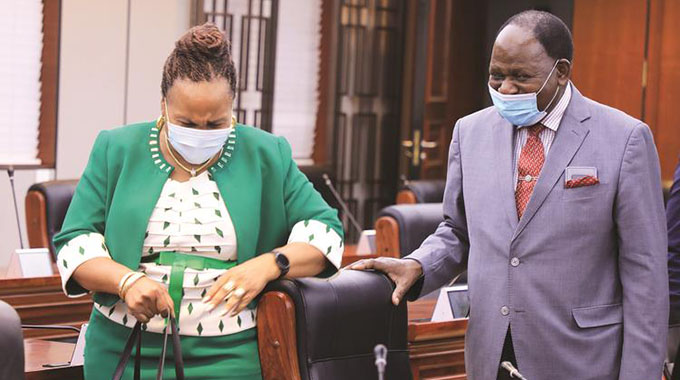New policy to ease housing backlog

PROPOSED ZIMBABWE NATIONAL HUMAN SETTLEMENTS POLICY
Cabinet considered and approved the Zimbabwe National Human Settlements Policy as presented by Vice President Honourable KCD Mohadi, as chairman of the Cabinet Committee on Social Services and Poverty Eradication. The policy is guided by and seeks to inform implementation of the relevant aspects of Agenda 2030 (Sustainable Development Goals), the African Union Agenda 2063, Zimbabwe’s Vision 2030, the national Constitution and national and international resilience frameworks.
The policy will introduce a raft of changes that will ensure that planning, development and management of settlements is in line with national and international disaster risk reduction frameworks, and with environmental and climate change policies, laws and standards. This will help address huge housing and social amenities backlog as well as widening disparities between rural and urban areas. It is also expected to reduce the high costs of building materials and housing finance.
The policy will provide for, among others, the following:
Disaster risk assessments and mapping;
Environmental impact assessments and mitigation, and
Integrating implications of climate change into aspects of rural and urban settlement planning, development and management.
All State land earmarked for human settlements shall be managed through the Ministry responsible for National Housing and Social Amenities and the respective local authorities for ease of coordination and for accountability. All local authorities will be expected to have spatial planning units manned by registered spatial planners. This committee and the sub-council structures will be responsible for development planning, control and facilitation in each local planning area.
Cognisant that land is a finite resource, all productive agricultural land will be preserved as such. To curb settlement sprawl, 40 percent of land for human settlements development will be reserved for the construction of high-rise flats/buildings. Densification of settlements will be promoted. Cabinet approved the policy and resolved that:
Social housing for the destitute as well as social institutions for orphans and the aged should be incorporated whenever human settlements are being planned;
There be a provision for the relocating household displaced by natural disasters to planned settlements, for example, Cyclone Idai victims;
Title deeds be provided, where appropriate, for houses on agro-plots;
Partnerships for financing models be incorporated;
Social amenities provision encompassing swimming pools, play centres, youth centres and women’s clubs and libraries be incorporated in the Policy and
That a committee comprising of Ministers of National Housing and Social Amenities; Finance and Economic Development, and Local Government and Public Works come up with an appropriate financing model to operationalise the Policy.
PRINCIPLES FOR THE ZIMBABWE INDEPENDENT COMPLAINTS COMMISSION BILL
Cabinet considered and approved the principles for the Zimbabwe Independent Complaints Commission Bill as presented by the Minister of Justice, Legal and Parliamentary Affairs. The objective is to provide for the establishment and functions of the Zimbabwe Independent Complaints Commission thereby operationalising section 210 of the Zimbabwe Constitution which says an “Act of Parliament must provide an effective and independent mechanism for the receiving and investigating complaints from members of the public about misconduct on the part of members of the security services, and for remedying any harm caused by such conduct”. The commission will among other responsibilities investigate complaints by the public against members of the security services.
ZIMBABWE’S RESPONSE TO THE CORONAVIRUS (COVID-19)
Cabinet received an update on the Covid-19 pandemic from the Minister of Defence and War Veterans Affairs, Honourable OCZ Muchinguri-Kashiri, chairperson of the Ad-Hoc Inter-Ministerial Task Force on the Covid-19 outbreak.
The country has now recorded 8 362 confirmed Covid-19 cases compared to the 8 257 reported last week. The recovery rate is 94 percent with a total of 7 884 persons having recovered from the virus compared to the 7 771 recoveries that were reported last week. New cases for week 43 stood at 105, compared to 158 in week 42. The total number of infected health care workers remains at 653, all of whom have since recovered as of today. To date, a total of 242 deaths have been recorded.
A total of 5 457 PCR tests were conducted during the reporting period compared to 5 470 tests carried out the previous week. Deliberate efforts are being made to stockpile testing consumables in preparation for the re-opening of the ports of entry and exit as well as the festive season.
A total of 85 new boreholes were drilled, while 123 others were rehabilitated by Government and partners during the reporting period. This brings the total number of drilled and rehabilitated boreholes to 4 580 since the beginning of the campaign against Covid-19. Water production in the City of Harare, currently stands at the rate of 200 mega-litres per day. Furthermore, water purification equipment, valued at about US$9,3 million, purchased from Germany by Government has started arriving in the country and is expected to significantly boost the pumping capacity and water pressure at several Harare pump stations, including Alexandra Park, Letombo and Waterfalls.
Regarding primary and secondary education, Cabinet was informed that Grade 6, Form 3 and Lower 6th classes resumed on October 26, 2020, under Phase 2 of the re-opening of schools.
The overall learner attendance rate for Phase 2 was 32.02 percent, with the highest attendance rate being recorded in Masvingo province (54.95 percent) while Matebeleland North and South had the lowest, with 7.10 percent and 13 percent, respectively. The overall teacher attendance rate for the week was 27.16 percent, representing a 5,71 percent increase from the 21.45 percent recorded last week.
Cabinet resolved that an outreach exercise be undertaken by the Inter-Ministerial Task Force to all provinces to remind and raise awareness among the citizenry and local leadership of the threat of Covid-19 spike during the impending rainy season. Cabinet reiterates the need for the public not to lose vigilance through complacency. The task force is currently engaging with their South African counterparts in order to ensure smooth flow of vehicular traffic at the Beitbridge Border Post.
UPDATE ON HEALTH ISSUES: WITHDRAWAL OF LABOUR BY NURSES
Cabinet was briefed by Vice President Honourable CGDN.Chiwenga, as the Minister of Health and Child Care, on the withdrawal of labour by nurses. At its 38th meeting held on October 28, 2020, Cabinet was informed that the Zimbabwe Nurses Association (ZINA) openly challenged the Cabinet decision on the cancellation of the flexi-working arrangement and defied the secretary for Health and Child Care’s directive for the association to reverse its statement. Cabinet resolved to cancel the flexi hours arrangement and that nurses who fail to report for duty be subjected to disciplinary processes, that daily attendance registers for nurses be submitted to the Health Services Board and the Ministry of Health and Child Care head office; and that nursing services be restructured to be supported by three pillars; namely contract workers; health service permanent workers; and secondment from the uniformed forces.
Unfortunately some nurses, have continued to defy the Government directive banning the “flexi hours” regime. The various nurses’ labour organisations comprising the Zimbabwe Nurses Association; Confederation of Nurses Association; Theatre Nurses Association and the Nurses Educators Association met with the Health Services Board and resolved to comply with the Government directive save for the Zimbabwe Nurses Association. A total of 1 280 nurses failed to heed to the call to return to normal working hours.
The Health Services Board has started instituting disciplinary hearings for the defiant nurses.
ENHANCEMENT OF STATE ENTERPRISES AND PARASTATALS PERFORMANCE
Cabinet deliberated at length on the ways of enhancing parastatal performance. From the ensuing wide-ranging discussion, it was agreed that an Inter-Ministerial Committee be established to consider the matter further and proffer concrete recommendations that takes into consideration the structure; performance; accountability and governance of the State enterprises.







Comments